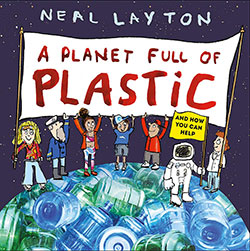So many of us are keen to reduce plastic consumption and become more aware of what is being thrown away and where it is ending up. This fantastic picture book by Neal Layton is a great way to encourage young children to think about their own use of plastic and what impact it has on our world. It’s written in a friendly, non-preachy voice that children will engage with, and the characterful and distinctive illustrations, packed with details and additional facts, really enhance the message.
The book gives an entertaining introduction to how plastic was invented and how its use has evolved and exploded, then gives an excellent child-friendly description of how objects biodegrade (and how plastic doesn’t). The book strays away from demonising plastic (which is useful and important after all), but instead focusses on what happens when it ends up where it’s not supposed to be (ultimately, contaminating the natural environment, particularly the oceans). An explanation of what microplastics are and how their toxins can get into the food chain is included, and also a map depicting the (shockingly enormous) ocean Garbage Patches. Practical examples of what can be done to help are provided, emphasising the important ‘Reduce, Re-Use, Recycle’ message. The final few pages are on a positive note, describing some of the clever ideas that scientists and engineers are devising to help clear up the mess. We loved the concluding message delivered by a smiley-faced Planet Earth: if we work together, we can sort this out.
Neal Layton’s trademark illustrative style (a collage of appealing doodle-like sketches and photography) works so well here and should help children absorb the reality of the situation. In one spread, he has sketched marine animals tangled in and eating plastic waste; the surface of the water is a photograph of a massive jumble of man-made junk.
(This book was purchased from our picture book wishlist by one of our generous supporters).
 Explaining in a simple and non-threatening way why plastic can be a big problem for the environment and encouraging children to take steps to improve things.
Explaining in a simple and non-threatening way why plastic can be a big problem for the environment and encouraging children to take steps to improve things. 
